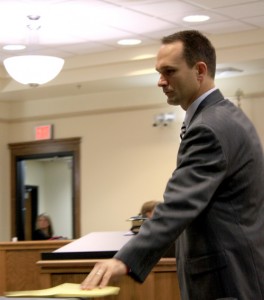
Austin Ramsey
News Editor
Benton, Ky. – Jerry Walker, the Paducah, Ky., man charged with the 1998 Hester College fire, is set to stand trial for the 13-year-old crime that killed one student and critically injured another.
The tentative trial date was set by Judge Dennis Foust at the Nov. 21 status hearing. Jury selection will begin on July 6.
The fire, which occurred in the early morning on Friday, Sept. 18, 1998, was reportedly set on the fourth floor of Hester College. It blazed through a hallway, trapping Michael Minger, a sophomore music student from Niceville, Fla., who was found unconscious in the doorway to his room and pronounced dead at the hospital.
A second student, Michael Priddy, was also found unconscious, though rescue crews were able to revive him. Another 14 students were rescued from the residential college interior, along with Walker.
Kentucky State Police investigators declared the fire arson when traces of accelerant were found. Several arrests were made, but all were dropped.
Prosecutors in the first trial showed surveillance photos of Walker purchasing $1 worth of gasoline 30 minutes before the fire.
He was tried in 1999 but acquitted in 2001 due to a hung jury.
Walker, 35, arrived in Marshall County Circuit Court Monday morning for a status hearing, where Judge Dennis Foust heard motions filed under the case since Walker’s arraignment in September.
The Commonwealth is charging Walker with second degree manslaughter, first-degree arson, second-degree assault and 14 counts of first-degree wonton endangerment.
Walker’s attorney, Dennis Null, and his son, Richard, introduced two motions to dismiss the case for a violation of the right to a speedy trial and a double jeopardy.
However, Foust dismissed a third motion for a change of venue before the defense was given time to plea their case.
“I don’t think the venue issue is one that really needs to be voted on,” he said in his opening remarks to the court.
Foust then entertained remarks from the defense. Richard Null said Walker’s violated right to a speedy trial was due to the prosecution’s reopening of the case after his acquittal.
Richard Null said the delay was the fault of the prosecution, who became more at fault with each passing day, an act of negligence on the government’s part, he said.
Since 2001, Walker married, had three children, has become a part-time minister and, until earlier this month, was the assistant principal at Paducah Middle School.
“The responsibility of the delay has nothing whatsoever to do with him,” Richard said. “Every day the government, in this case, decided ‘we don’t want to charge Mr. Walker.’ The day after that trial in June 2001, they had to make a decision.”
Richard also argued the Commonwealth’s delay was “presumptively prejudice” against the defense and the trial itself.
“The Commonwealth may never know how it’s been prejudiced,” he said. “There’s absolutely no way anybody’s memory of what happened 13 years ago is better today than it was in June of 2001.”
Richard Null continued, saying the cited Supreme Court case dealt with a defendant who had not seen a courtroom for eight-and-a-half years.
Walker’s re-indictment came more than 10 years after his 2001 acquittal, Richard reminded the court.
An expanse of time that lengthy violated Walker’s right to a speedy trial, he told Foust.
Blankenship argued the Commonwealth simply could not accept the case’s dismissal on grounds of a speedy trial, because Walker’s case in 2001 was dismissed, and he was held accountable for no crimes during the amount of time between that trial and Blankenship’s current case against him.
“The law is crystal clear about a speedy trial,” he said. “You only have that argument if you’re under an indictment.”
Dennis Null rebutted Blankenship’s argument, saying Walker’s emotional stress was heightened, since the original trial was dismissed without prejudice, allowing the court to retry him on similar charges.
Foust asked Blankenship to confirm the trial had been resubmitted earlier this year after a review of his existing file.
Blankenship said there was some new evidence, but when Foust asked him what that evidence was and why it had not been submitted to the grand jury, Blankenship said the analysis of his case would present existing evidence in a different way.
Foust ended the hearing by setting a tentative trial date for Friday, July 6 to begin jury selection, but under request from the defense, he also set another motions hearing for Dec. 22.
Contact Ramsey



























































































